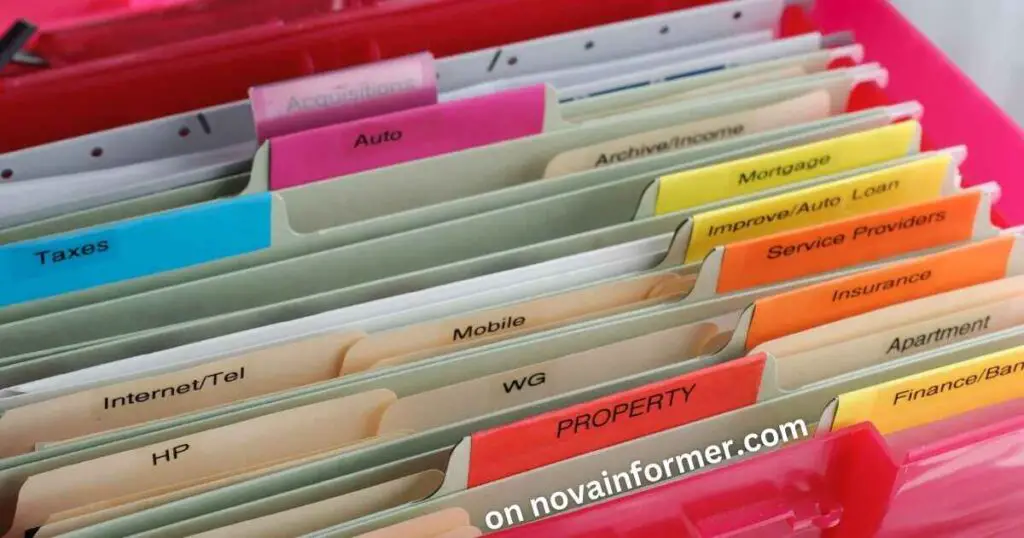Ever opened your wallet and felt a knot in your stomach? Or perhaps you’ve stumbled upon a forgotten bill under a pile of papers?
Money problems are a common source of stress, but taking charge of your finances can change that.
With a little organization, you can turn financial chaos into calm.
Why Organize Your Finances?
Picture this: you wake up each morning knowing exactly how much money you have and where it’s going. No more surprise expenses, no more overdraft fees.
That’s the power of financial organization.
It’s more than just neat paperwork, it’s about:
- Reduced Stress & Anxiety: Let’s face it, money worries can keep you up at night. Knowing your financial situation allows you to sleep soundly.
- Better Money Habits: When your finances are organized, you’re more likely to spend thoughtfully and save consistently. You’ll see where your money goes and make informed decisions.
- Improved Credit Score: Organized finances mean you’re less likely to miss payments. This not only saves you money on late fees but also builds a healthy credit history, opening doors to lower interest rates and better financial opportunities.
- Reaching Your Goals: Whether it’s a dream vacation, a new car, or simply a comfortable retirement, organized finances make it easier to set and achieve your goals. It’s like having a clear roadmap to your financial destination.
1. Track Your Spending: Where Does Your Money Go?
The first step to financial peace of mind is knowing where your money is going.
This means keeping track of every penny you spend, from your morning coffee to your monthly rent.
- The Old-School Way: If you prefer a pen and paper, carry a small notebook and jot down every expense. At the end of the day, transfer the details to a spreadsheet or budgeting app.
- The Tech-Savvy Way: Several budgeting apps automatically track your spending by connecting to your bank account. They categorize your expenses, provide visual representations, and even send alerts if you’re overspending.
Make it a Habit
Spend a few minutes each day reviewing your expenses. This helps you stay aware of your spending patterns and identify areas where you can cut back.
It’s also an excellent way to catch any errors or fraudulent charges on your accounts.
2. Create a Budget: Give Your Money a Job
Think of a budget as a plan for your money. It’s like assigning each dollar a specific task.
- Start with Your Income: Calculate your total monthly income from all sources, including your salary, side hustles, or any other regular earnings.
- List Your Expenses: Categorize your expenses into fixed (e.g., rent, utilities) and variable (e.g., groceries, entertainment). Don’t forget to include occasional expenses like car maintenance or birthday gifts.
- Allocate Your Income: Assign a portion of your income to each expense category. Start with your fixed expenses, then allocate the rest to variable expenses and savings.
- Review and Adjust: Your budget should be a living document. Review it regularly to see if it’s working for you. If you overspend in one category, you may need to adjust other categories to compensate.
3. Pay Bills on Time: Avoid Late Fees and Stress
Late payments can cost you more than just extra fees.
They can also damage your credit score, making it harder and more expensive to borrow money in the future.
- Set Reminders: Mark due dates on your calendar or set up reminders in your phone or budgeting app.
- Automate Payments: Many banks and service providers offer automatic bill payment options. This can help you avoid late fees and ensure timely payments.
- Pay Bills as Soon as You Get Them: Don’t let bills pile up. Paying them promptly keeps you in control and reduces stress.
4. Set Financial Goals: What Do You Want to Achieve?
Financial goals give you a sense of purpose and direction.
They can be short-term (e.g., saving for a down payment on a car), medium-term (e.g., paying off student loans), or long-term (e.g., retiring comfortably).
- Specific: Clearly define your goals. Instead of saying “I want to save money,” say “I want to save $5,000 for a down payment on a car within two years.”
- Measurable: Track your progress. How much have you saved so far? How much more do you need to save?
- Achievable: Set realistic goals. Don’t set yourself up for failure by aiming too high.
- Relevant: Choose goals that matter to you. What do you really want to achieve with your money?
- Time-Bound: Set deadlines for your goals. This will help you stay motivated and on track.
5. Use Technology: Make Managing Money Easier
The digital age offers a wealth of tools to simplify financial management.
| App Type | Examples | Features |
| Budgeting | Mint, YNAB, PocketGuard | Track spending, create budgets, visualize progress |
| Bill Payment | Prism, Doxo | Track bills, set reminders, pay bills online |
| Investment | Acorns, Robinhood | Invest in stocks, ETFs, or other investment options |
| Credit Monitoring | Credit Karma, Experian | Monitor credit score, get alerts for changes |
Beyond apps, use cloud storage to store financial documents digitally, making them easily accessible and reducing clutter.
Additionally, online banking and bill payment platforms can automate many financial tasks, saving you time and effort.
Conclusion: Take the First Step to Financial Freedom
Organizing your finances may seem like a daunting task, but remember, it’s a journey, not a sprint.
Start small, take it one step at a time, and soon you’ll see the difference.
By implementing these tips and tricks, you can create a system that works for you, making your financial life less stressful and more rewarding.
Don’t wait any longer. Take the first step today and unlock the door to financial freedom!



